Previous 1 2 3 4 5 6 7 ... 20 Next

Well played, sir!

Thanks
![Drink up [B-o]](./images/smilies/drinkup.gif)
Another funny thing I noticed is how similar US national security advisor John Bolton looks when compared to Pakistani Pashtun Chief Minister Pervez Khattak...
Once John Bolton goes on diet, he will look exactly similar to our guy
John Bolton
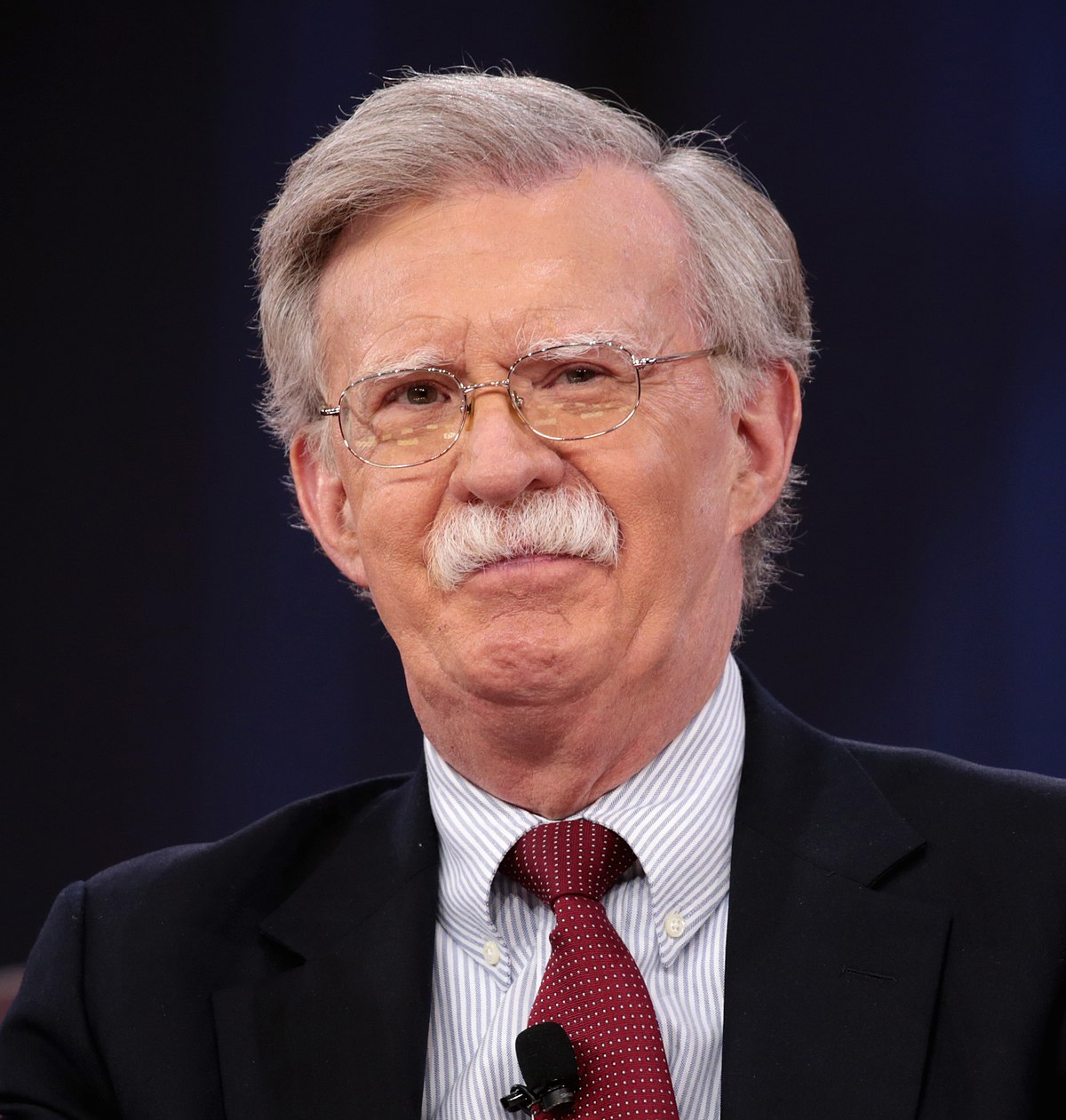
Pervez Khattak

That is scary similar. Good catch.
![Drink up [B-o]](./images/smilies/drinkup.gif)
My pigeon....code-named; Captain Ghutargoo
All his fault is that he is Pakistani and was planning to shit on Indians
I salute him for not opening his mouth despite getting sever torture by Indian authorities.


China Pakistan Economic Corridor CPEC Documentary National Geographic
Oooh, the Karkoram Hwy is nice to see again! I got to see some of it when I had some business in Hasanabdal at the Cadet College. It was a pretty place to visit especially in the winter.
Yup
Under CPEC, this marvel is being transformed into more good one
Hasan Abdal and Havelian
This is currently a 54 kilometres (34 mi) of 2 lane roadway referred to as the N-35. Work is underway to construct a new 59-kilometre-long (37 mi), six-lane controlled-access highway between Hasan Abdal and Havelian which upon completion will be officially referred to as the E-35 expressway, or Hazara Motorway
https://en.wikipedia.org/wiki/Reconstruction_of_the_Karakoram_Highway
Making of KKH....Lot of Pakistanis and Chinese labourers died while doing it.
Pakistani civilians ranked 4th in holding world’s firearms
UNITED NATIONS: Pakistanis are among the top five nations’ in the list of 25 top-ranked countries and territories holding world’s firearms, according to the new study.
There are more than one billion firearms in the world but 85 percent of those are in the hands of civilians, with the remainder held by law enforcement and the military, says the survey report released Small Arms Survey.
Interestingly, Americans make up only four percent of the global population but they own 40 percent of the world’s firearms.
Of the 857 million guns owned by civilians, Pakistan is ranked at number four with 43.9 million of its civilians holding firearms. The US is at the top with 393 million followed by India at 71 million and China at 49.7 million.
Similarly in the list of the largest reported and estimated military-owned firearms holdings, Pakistan is at the number 10 with 2.3 million firearms in a list of top-10 countries.
Elucidating method to measure military firearms, the report says the study uses two main approaches for calculating military firearms holdings of armed forces: official data on military firearms holdings and estimates based on the use of a doctrinal category multiplier applied to the number of military personnel in a country.
The survey, produced by the Graduate Institute of International and Development Studies in Geneva, says it bases its estimates based on multiple sources, including civilian firearms registration data from 133 countries and territories and survey results in 56 countries.
“The biggest force pushing up gun ownership around the world is civilian ownership in the United States,” said Aaron Karp, one of the authors of the report which compiles new data from the last ten years. “Ordinary American people buy approximately 14 million new and imported guns every year,” Karp told a news conference at UN headquarters in New York.
Americans have access to powerful firearms that are not available in many other countries due to tighter legislation.
“Why are they buying them? That’s another debate. Above all, they are buying them probably because they can. The American market is extraordinarily permissive,” he said.
Gun ownership rates vary across the world, with 121 firearms for every 100 residents in the United States compared to 53 in Yemen, 39 in Montenegro, and 35 in Canada.
Japan and Indonesia are at the other end of the spectrum with less than one firearm per 100 people.
Only 28 countries released information on their military stockpiles while 28 nations offered information the firearms owned by law enforcement agencies.
https://arynews.tv/en/pakistani-civilians-ranked-4th-world-firearms/
Oh dear...The jewellery of men as Pakistani Pashtuns say ![]() THE GUNS...
THE GUNS...
Pakistan made MP 5 gun exported to American Market.
----------------
The Gun Markets of Pakistan....This video is years old...Pak army is there and Taliban have been pushed back to Afghanistan while these local people are very good, fierce and hospitable ![]()
Woman, child among six Pakistani prisoners set free by India
https://www.geo.tv/latest/199799-woman-child-among-six-pakistani-prisoners-set-free-by-india
ISLAMABAD: Six Pakistani prisoners including a woman and child reached the country on Tuesday via the Wagah border after they were set free by India.
A spokesperson of the Pakistani High Commission in New Delhi had confirmed the prisoners' release earlier today.
The Pakistani nationals — who were imprisoned in different jails, camps, and minor jails — were handed over to the authorities in the presence of Pakistani High Commission officials.
Nasreen Akhter, who was sentenced to 10 years and six months, was among the freed prisoners. Her fine was paid by the Pakistani High Commision in January 2017.
According to the High Commission's spokesperson Khawaja Muaz Tariq, a child, Ali Haroon, was also among the released prisoners.
The Pakistani High Commission had earlier held talks with Indian authorities. At least 52 Pakistani prisoners who have completed their sentence, including 37 fishermen and four children, are imprisoned in Indian jails, Tariq said. The release of these prisoners is expected in the near future.
Pakistan to kick off Women’s World T20 2018 campaign against Australia
Samaa Web Desk 4 hours ago 
Pakistan will kick off its Women’s World Twenty20 2018 campaign against Australia on November 9, 2018 at Guyana.
International Cricket Council (ICC) announced the schedule for the tournament on Friday afternoon.
The 10-team tournament, featuring three-time champions Australia, reigning ICC Women’s World Cup winners England, India, New Zealand, Pakistan, South Africa, Sri Lanka and defending champions the West Indies, plus two qualifiers, will be played across three venues in the Caribbean.
Group A consists of England, South Africa, South Africa and Qualifier 1. Pakistan, Australia, New Zealand and Qualifier 2 are placed in Group B.
Pakistan will face arch rivals India on November 11 and Qualifier 2 on November. They take on New Zealand on November 15.
Pakistan captain Bismah Maroof said that the tournament is one of the top events that everyone waits for with anticipation.
“Last year’s World Cup and many other subsequent matches have shown a rise in standards of women’s cricket and I’m sure there will be a lot of good cricket played in the West Indies too,” she said.
“Our players are looking forward to the tournament with great anticipation and will give it our best shot as the league phase kicks off on November 9.”
ICC, in its release, stated that Decision Review System (DRS) will be used for the first time in any ICC World Twenty20 event, ensuring consistency in the use of technology in top world-level events.
https://www.samaa.tv/sports/2018/06/pakistan-to-kick-off-womens-world-t20-2018-campaign-against-australia/amp/?__twitter_impression=true
--------
Pakistan Hockey: Prayers are not enough
(WebDesk) - There was a time when Pakistan used to win gold medal in its national game Hockey. How golden eras of 1971, 1978, 1982 and 1994 were where Pakistan led the Hockey World Cup. Even at every Asian tournament Pakistan used to stand out. Gone are those days, now Pakistan is nowhere to stand at.
Just recently Pakistan got whitewashed by Indian hockey team by 4-0 in 2018 Men s Hockey Champions Trophy. In the second match Pakistan team, as usual, could perform miracle. Australia defeated Pakistan with 2 goals as compared to 1 by Pakistan.
Pakistan got whitewashed by Indian hockey team by 4-0 in 2018 Men s Hockey Champions Trophy. Photo: TNN
Watching Pakistan being thrashed severely especially by India is heart-rending for the nation once was a freak of National game, Hockey.
Unfortunaltely, the generation have lost interest in national game, hockey, the players lost efficiency and the pride of conquering the World cups for the four times had been stolen by not so arch rivals.
Pakistan bagged World Cup for as many as four times.
Its a high time to cheerish our players and have Pakistan flag retain its position on zenith.
Keeping the lack of attention, financial as well as non-financial support, over the national game into consideration, it can be projected that only a miracle can save Pakistan national game.
There was a time when Pakistan used to rule the world of hockey, but now the situation has turned upside down. Owing to negligence of authorities, Pakistan hockey is unable to produce legends like Dr. Tariq Aziz, Munir Ahmed, Akhtar Rasool, Samiullah Khan.
At this moment one can only pray for the revival of hockey team. For the longer run, prayers will not be enough as there would be a need to take practical steps on urgent bases to catch up with India at least.
Written by Junaid Ali Malik
https://dunyanews.tv/en/Sports/445056-Pakistan-Hockey:-Prayers-are-not-enough
Kashmir inalienable for us, Pakistan's empty rhetoric won’t change it: India at UN
UNITED NATIONS: India has told Pakistan that no amount of "empty rhetoric" by it will change the reality that Jammu and Kashmir is an "inalienable" part of India after Islamabad's envoy to the UN made a reference to the Indian state at a UN General Assembly debate.
Pakistan's Ambassador to the UN Maleeha Lodhi's reference came during her remarks yesterday in the General Assembly debate on 'The Responsibility to Protect and the Prevention of Genocide, War Crimes, Ethnic Cleansing and Crimes against Humanity.' Lodhi said people in Kashmir are among victims of "egregious crimes" such as killings and mass-blinding.
India exercised the Right of Reply, strongly rejecting Pakistan's reference to Kashmir in the 193-member UN body.
"While we are having this serious debate for the first time in a decade on an issue that is of importance to all of us, we have witnessed that one delegation has, yet again, misused this platform to make an unwarranted reference to the situation in the Indian state of Jammu and Kashmir," First Secretary in India's Permanent Mission to the UN Sandeep Kumar Bayyapu said in India's Right of Reply.
Bayyapu said such cynical attempts by Pakistan to raise the Kashmir issue in the UN have failed in the past and do not find any resonance in the UN body. "I would like to place on record and reiterate that the state of Jammu and Kashmir is an integral and inalienable part of India. No amount of empty rhetoric from Pakistan will change this reality," he said.
In her remarks earlier in the day, Lodhi had said if the international community is "selective" in its approach where it is expressing indignation at some transgressions while choosing to willfully ignore others, then any norm will be quickly turned into mere pretense.
https://economictimes.indiatimes.com/news/defence/pakistan-told-jammu-and-kashmir-an-inalienable-part-of-india-at-united-nations/articleshow/64743258.cms
----------
'Green gold': Pakistan plants hundreds of millions of trees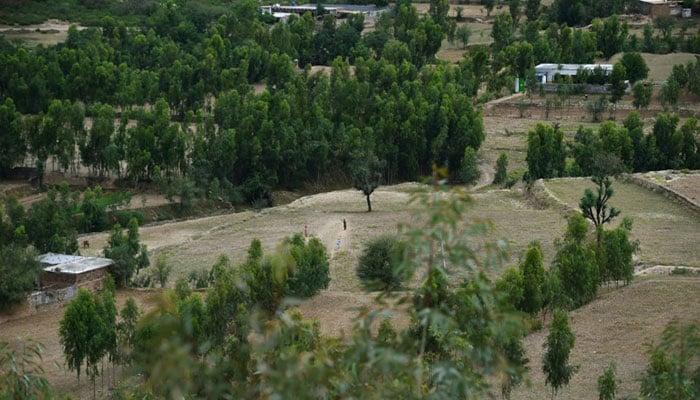
Children play cricket in a tree plantation in Heroshah district in northwest Pakistan. Photo: AFP
HEROSHAH: The change is drastic: around the region of Heroshah, previously arid hills are now covered with forest as far as the horizon. In northwestern Pakistan, hundreds of millions of trees have been planted to fight deforestation.
In 2015 and 2016 some 16,000 labourers planted more than 900,000 fast-growing eucalyptus trees at regular, geometric intervals in Heroshah — and the titanic task is just a fraction of the effort across the province of Khyber Pakhtunkhwa.
"Before it was completely burnt land. Now they have green gold in their hands," commented forest manager Pervaiz Manan as he displayed pictures of the site previously, when only sparse blades of tall grass interrupted the monotonous landscape.
The new trees will reinvigorate the area's scenic beauty, act as a control against erosion, help mitigate climate change, decrease the chances of floods and increase the chances of precipitation, says Manan, who oversaw the revegetation of Heroshah.
Residents also see them as an economic boost — which, officials hope, will deter them from cutting the new growth down to use as firewood in a region where electricity can be sparse.
"Now our hills are useful, our fields became useful," says driver Ajbir Shah. "It is a huge benefit for us."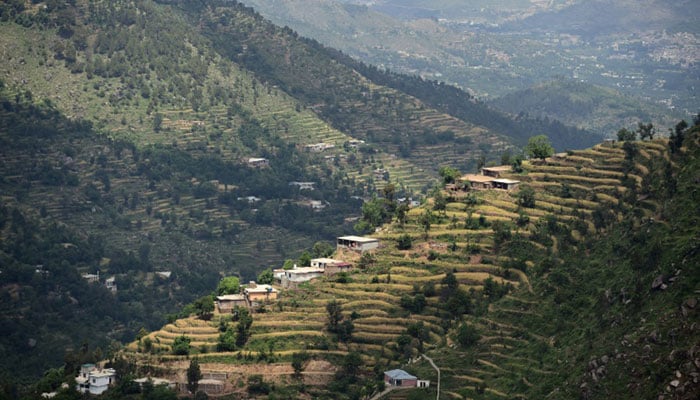
The Swat valley of Khyber Pakhtunkhwa in northwest Pakistan, where previously arid hills are now covered with forest as far as the horizon. Photo: AFP
Further north, in Khyber Pakhtunkhwa´s Swat, many of the high valleys were denuded by the Pakistani Taliban during their reign from 2006 to 2009.
Now they are covered in pine saplings. "You can't walk without stepping on a seedling," smiles Yusufa Khan, another forest department worker.
The Heroshah and Swat plantations are part of the "Billion Tree Tsunami", a provincial government programme that has seen a total of 300 million trees of 42 different species planted across Khyber Pakhtunkhwa.
A further 150 million plants were given to landowners, while strict forest regeneration measures have allowed the regrowth of 730 million trees — roughly 1.2 billion new trees in total, the programme´s management says.
'Transparency'
Kamran Hussain, a manager of the Pakistani branch of the World Wildlife Fund, who conducted an independent audit of the project, says their figures showed slightly less — but still above target at 1.06 billion trees.
"We are 100 percent confident that the figure about the billion trees is correct," he told AFP, highlighting the transparency of the process. "Everything is online. Everyone has access to this information."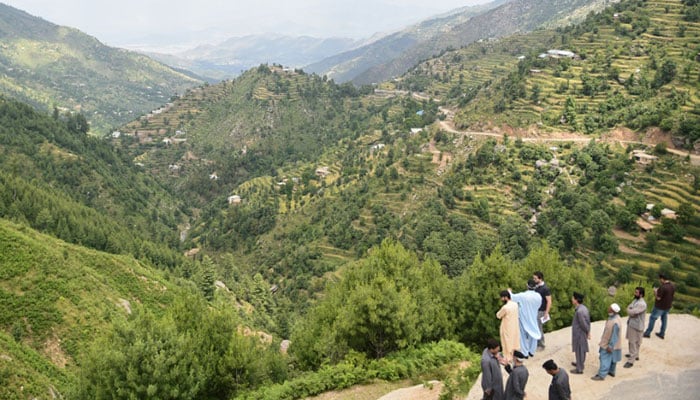
Staff from the Khyber Pakhtunkhwa forest department overlook the forest in Swat valley, northwestern Pakistan. Photo: AFP
The programme has been praised by the head of the Swiss-based International Union for Conservation of Nature (IUCN), a green NGO, which called it a "true conservation success story".
Initially mocked for what critics said were unrealistic objectives, it is a welcome change to the situation elsewhere in the country.
Pakistani authorities say just 5.2 percent of the country is covered by forest, against the 12 percent recommended by the United Nations.
Just one big tree remains in the poverty-stricken village of Garhi Bit in the southern province of Sindh, shading its small mosque.
It has stood there for a century, locals say.
"Before, there were big trees, many kinds of them," says Dad Mohammad, a 43-year-old farmer.
"But they started to dry because of the lack of water, so we cut them," he says, pointing to hundreds of metres of cultivated land where previously there stood a forest.
'Disaster'
More than 60 percent of the forests lining Sindh's riverbanks have disappeared in the last 60 years, mainly due to river depletion and massive logging during the 1980s, says Riaz Ahmed Wagan, of the provincial forest department.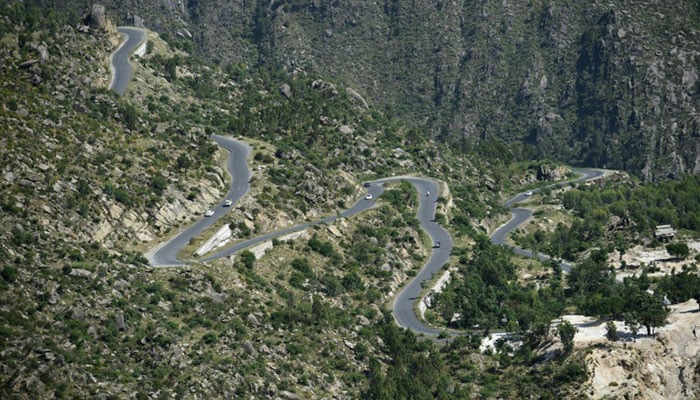
Hairpin bends snake through a tree plantation in Buner in northwest Pakistan. Photo: AFP
"It is a disaster," he says, adding that forestry remains the lowest priority on the agenda of the provincial governments.
The Billion Tree Tsunami, which cost the Khyber Pakhtunkhwa government $169 million, started in November 2014. Officials say they are still implementing maintenance safeguards such as fire protection, with the project due to be completed in June 2020.
In early 2017, the federal government announced its own Green Pakistan Project, which aims to plant 100 million trees in five years across the country.
It ranges from "legislative reforms" to "wildlife protection", according to its leader Ibrahim Khan, who works under the authority of the ministry for climate change. More than a quarter of the work was done by the end of April this year, he says.
Khyber Pakhtunkhwa is ruled by Pakistan Tehreek-e-Insaf (PTI), the political party headed by former cricketer Imran Khan, which is the main challenger to the ruling Pakistan Muslim League-Nawaz (PML-N) as the country heads into a general election next month.
Khan has vowed to make the environment an election issue, and to plant a total of 10 billion trees across the country. "Every child in Pakistan should be aware of the environmental issue which, until now, has been a non-issue," he told AFP.
But it is yet to be seen whether his ambitions will translate into votes.
Pakistani environmental lawyer and activist Ahmad Rafay Allam says that in a country where the electorate is often swayed by infrastructure projects rather than the environment, he has doubts.
"It would be a first," he told AFP.
https://www.geo.tv/latest/200732-green-gold-pakistan-plants-hundreds-of-millions-of-trees
Well good for Pakistan in reforesting! ![Drink up [B-o]](./images/smilies/drinkup.gif)
That's one of the best things you can do to revive an environment is to bring back the trees.
Now you just have to get the peasants to stop cutting down every last tree for charcoal. Switch them over to propane or something else for cooking and then the forests will revive in the long term.
And that will mean revived watersheds, wildlife, and better farming! ![Drink up [B-o]](./images/smilies/drinkup.gif)
Trees reduce soil leeching, and their leaves and needles provide compost. It truly is a all-round win.
![Drink up [B-o]](./images/smilies/drinkup.gif)
That's one of the best things you can do to revive an environment is to bring back the trees.
Now you just have to get the peasants to stop cutting down every last tree for charcoal. Switch them over to propane or something else for cooking and then the forests will revive in the long term.
And that will mean revived watersheds, wildlife, and better farming!
![Drink up [B-o]](./images/smilies/drinkup.gif)
Couldn't agree more with both you....Thanks
-------
I found another interesting video...That depicts the transformation of Pakistani women regarding her dressing and fashion for last 100 years....May be not for all but for good number of Pakistani women....
100 Years of Beauty DESI | PAKISTAN | Instagram: @itshumasharif
The India WhatsApp video driving people to murder - BBC News
------
Sad news, this just recently came in....RIP
Read in local news papers that injured ones are British folks...Hope they are okay and rescued quickly
Avalanche kills Austrian mountaineer in Pakistan
Islamabad: An Austrian mountaineer was killed and two others injured after their tent was hit by an avalanche in northern Pakistan, officials said on Saturday.
The avalanche struck the men 5,900 metres up Ultar Sar mountain, located in Pakistan´s northern Hunza valley.
"Austrian mountaineer Christian Huber was killed," local Hunza police official Wajid Karim told AFP.
He named the injured mountaineers as British national Bruce Normand and Timothy Miller, whose nationality was not immediately known.
Karim said efforts were underway to bring Huber´s body and the injured mountaineers back to Islamabad.
An army helicopter could not carry out a rescue operation due to bad weather on the 7,388 metres high Ultar Sar, but a ground team were making their way up to the scene.
A local administration official who asked not to be named confirmed the incident and casualties.
Northern Pakistan is a magnet for mountaineers and is home to some of the tallest mountains in the world, including K2 -- at 8,611 metres, the world´s second highest peak, but often deemed a more challenging climb than the highest, Mount Everest.
Nestled between the western end of the Himalayas, the Hindu Kush mountains and the Karakoram range, Gilgit-Baltistan houses 18 of the world´s 50 highest peaks.
It is also home to three of the world´s seven longest glaciers outside the polar regions. Hundreds of its mountains have never been climbed.
https://www.thenews.com.pk/latest/335703-avalanche-kills-austrian-mountaineer-in-pakistan
--------
China lends $1 billion to Pakistan to boost plummeting FX reserves - sources
ISLAMABAD (Reuters) - China has lent Pakistan $1 billion to boost the South Asian country’s plummeting foreign currency reserves, two sources in Pakistan’s finance ministry told Reuters, amid growing speculation of another International Monetary Fund bailout.
The latest loan highlights Islamabad’s growing dependence on Chinese loans to buffer its foreign currency reserves, which plunged to $9.66 billion last week from $16.4 billion in May 2017.
The lending is the outcome of negotiations for loans worth $1-$2 billion that was first reported by Reuters in late May, the two sources told Reuters.
“Yes, it is with us,” said one finance ministry source, in reference to the Chinese money. The second source added that the “matter stands complete”.
The finance ministry spokesperson did not respond to a Reuters request for comment.
With the latest loan, China’s lending to Pakistan in this fiscal year ending in June is set to breach $5 billion.
In the first 10 months of the fiscal year China lent Pakistan $1.5 billion in bilateral loans, according to a finance ministry document seen by Reuters. During this period Pakistan also received $2.9 billion in commercial bank loans mostly from Chinese banks, ministry officials told Reuters.
Beijing’s attempts to prop up Pakistan’s economy follow a strengthening of ties in the wake of China’s pledge to fund badly-needed power and road infrastructure as part of the $57 billion China-Pakistan Economic Corridor (CPEC), an important cog in Beijing’s vast Belt and Road initiative.
But analysts say China’s help will not be enough and predict that after the July 25 national election the new administration will likely seek Pakistan’s second bailout since 2013, when it received a package worth $6.7 billion from the IMF.
“Looking at the current scenario, it is likely after the new government comes in that they will go to the IMF,” said Suleman Maniya, head of research at local brokerage house Shajar Capital.
https://www.reuters.com/article/us-pakistan-china-loans/china-lends-1-billion-to-pakistan-to-boost-plummeting-fx-reserves-sources-idUSKBN1JQ0TV
Good news !!!
Two British mountaineers marooned on Hunza Valley’s Ultar Sar Mountain have been located and rescued by teams of the Pakistan Army after their tent was struck by an avalanche.
According to Assistant Commissioner Hunza, the two British mountaineers recognized as Bruce Normand and Timothy Miller are presently on way to Gilgit in an army helicopter.
Adding further he stated: "The body of Austrian mountaineer Christian Huber, who was killed in the incident, is also being taken to Gilgit."
Attempts had been ongoing since Saturday to track down the two trapped mountaineers along with the body of the deceased Austrian climber after an avalanche from 5,900 meters up the Ultar Sar Mountain had struck their tent.
The parlous weather conditions had made it difficult for the Army helicopter to go forth with a rescue operation on the 7,388 meters high Ultar Sar.
The Northern Pakistan is a major attraction for numerous hiking enthusiasts as it dwells one of the highest peaks in the world including the 8,611 meter high K2, known to be the second highest peak in the world.
https://www.thenews.com.pk/latest/336019-pakistan-army-rescues-two-british-mountaineers-stranded-on
This was coming: Tehran Times blasts India after New Delhi goes defensive under US pressure
New Delhi, July 2: Days after India showed signs of bending its back under the Donald Trump Administration's pressure to cut trading ties with Iran -- its ally in West Asia - the latter's leading daily 'Tehran Times' lashed out at New Delhi, asking whether the US president is in charge of India's foreign policy.
In a piece titled the same, the newspaper derided India, one of the three biggest buyers of Iran's oil, buckled under America's pressure even as China and Turkey - the other two - did not. China, India and Turkey account for about half of Tehran's oil exports, the piece said.
"Ankara and Beijing have refused to cut oil imports from Iran, claiming that the corrosively unilateral U.S. sanctions are not binding on them so they won't pay heed to Trump's diktats. China, Iran's biggest purchaser, accounts for about one-quarter of Iran's oil sales - 600,000 barrels a day out of total 2.2 million barrels a day Iran exports. What makes it difficult to persuade China to limit its purchases from Iran is the escalating trade war between Beijing and Washington," the piece said.
India has been stressing on its relation with Iran in the recent times as part of its strategy to corner Pakistan. Prime Minister Narendra Modi went to Iran in June 2016 where the development of Chabahar Port as a counter to Gwadar Port in Pakistan was stressed upon. Even when Iranian President Hassan Rouhani came to India in February this year, there was enough indication that the two sides were working towards an enhanced cooperation. India had faced a similar pressure prior to the 2015 nuclear deal between Iran and the west but things improved after the deal was signed under the Barack Obama administration.
But after Donald Trump took over, things went downhill. A vocal critic of the 2015 deal, Trump eventually pulled out of the deal in May this year and reimposed sanctions on Tehran, leaving the entire mechanism derailed. Foreign Minister Sushma Swaraj had earlier said that India did not abide by any unilateral sanctions on Iran but only those approved by the UN. But a few days ago, the oil ministry asked the refiners to get ready for a 'drastic reduction or zero' imports of Iranian oil from November this year soon after US Ambassador to the UN, Nikki Haley, visited India and met the Indian leadership. The US also postponed the maiden '2+2' talks between Washington and New Delhi yet again.
"A few weeks ago, India's Foreign Minister Sushma Swaraj, in a rebuke to Trump administration, had declared that India will not respect unilateral U.S. sanctions against Iran and will recognize only the UN sanctions. It was seen as a principled stand against an unprincipled regime that seeks to impose its hegemony over the world. The vibes were nice but nobody exactly knew what was brewing behind the scenes," the Tehran Times report said.
"A few days ago, less than a month after Swaraj's statement, India buckled under the overwhelming U.S. pressure, betraying national interest and confirming its status as a pygmy, rather than a giant. Incidentally, it happened a day after U.S. ambassador to UN Nikki Haley visited India. India's oil ministry ordered refiners to prepare for drastic reduction or zero import of Iranian oil from November when the 180-day wind-down period ends. The news stirred hornet's nest in India as any cut in Iranian oil means substantial jump in oil prices in India, which will hit people hard."
The piece blasted the Modi government saying it acted over an "ill-advised" decision that will only hurt India's global reputation. It said responsible nation states act responsibly and never allowed anyone to bully or threaten them but by bowing under the US's pressure, India not just "risked its age-old ties with Tehran" but also got its weak diplomacy exposed.
"India's foolhardy decision to cut Iranian oil imports under U.S. pressure at a time when the U.S. government has imposed higher tariff on many Indian products shows how the power dynamics work. However, the mood is Iran remains upbeat. Iranians are not panicking just because India has backstabbed them. The country has seen the worst and bounced back stronger every time," it added.
https://www.oneindia.com/india/iran-media-blasts-india-us-pressure-to-cut-oil-ties-tehran-times-2726606.html
Previous 1 2 3 4 5 6 7 ... 20 Next